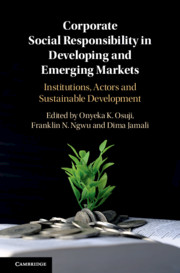 Corporate Social Responsibility in Developing and Emerging Markets
Corporate Social Responsibility in Developing and Emerging Markets Book contents
- Corporate Social Responsibility in Developing and Emerging Markets
- Corporate Social Responsibility in Developing and Emerging Markets
- Copyright page
- Dedication
- Contents
- Figures
- Tables
- Notes on Contributors
- Foreword
- Endorsement
- Preface
- Table of Cases
- Table of Legislation
- 1 Introduction to Corporate Social Responsibility in Developing and Emerging Markets: Institutions, Actors and Sustainable Development
- Part I Institutions, CSR Conceptualizations and Sustainable Development
- Part II CSR and Sustainable Development Cross-Country Studies
- Part III Normative and Utility Perspectives
- 14 Islamic Finance, Sustainable Development and Developing Countries: Linkages and Potential
- 15 Developing Countries’ Business Schools and Socially Conscious Business Leaders
- 16 Corporate Participation in Climate Change Mitigation in Developing Countries: ‘Green Capitalism’ as a Tool for Sustainable Development
- 17 Ethics Issues in Outsourcing to Emerging Markets: Theoretical Perspectives and Practices
- 18 Promoting Sustainability in Business and Management Education
- 19 Sustainable Finance, the Law and Stakeholders: Towards Responsible Social Movements
- 20 Sustainable Consumption, Consumer Protection and Sustainable Development: Unbundling Institutional Septet for Developing Economies
- 21 Corporate Social Responsibility and Sustainable Development in Developing and Emerging Markets: Looking Forward
- References
15 - Developing Countries’ Business Schools and Socially Conscious Business Leaders
from Part III - Normative and Utility Perspectives
Published online by Cambridge University Press: 18 December 2019
- Corporate Social Responsibility in Developing and Emerging Markets
- Corporate Social Responsibility in Developing and Emerging Markets
- Copyright page
- Dedication
- Contents
- Figures
- Tables
- Notes on Contributors
- Foreword
- Endorsement
- Preface
- Table of Cases
- Table of Legislation
- 1 Introduction to Corporate Social Responsibility in Developing and Emerging Markets: Institutions, Actors and Sustainable Development
- Part I Institutions, CSR Conceptualizations and Sustainable Development
- Part II CSR and Sustainable Development Cross-Country Studies
- Part III Normative and Utility Perspectives
- 14 Islamic Finance, Sustainable Development and Developing Countries: Linkages and Potential
- 15 Developing Countries’ Business Schools and Socially Conscious Business Leaders
- 16 Corporate Participation in Climate Change Mitigation in Developing Countries: ‘Green Capitalism’ as a Tool for Sustainable Development
- 17 Ethics Issues in Outsourcing to Emerging Markets: Theoretical Perspectives and Practices
- 18 Promoting Sustainability in Business and Management Education
- 19 Sustainable Finance, the Law and Stakeholders: Towards Responsible Social Movements
- 20 Sustainable Consumption, Consumer Protection and Sustainable Development: Unbundling Institutional Septet for Developing Economies
- 21 Corporate Social Responsibility and Sustainable Development in Developing and Emerging Markets: Looking Forward
- References
Summary
Organisations and managers are increasingly being held accountable for CSR in their spheres of operation. While a few organisations already have structures to deal with competing demands from stakeholders with regards to corporate social responsibilities, some are caught flatfooted. This paper takes a look at the theoretical underpinning of CSR and CRS education in the literature. It also focuses on exploring the following questions. How do leaders or managers acquire the sensibilities of being in tune with the social responsibilities of an organisation? How do managers acquire the necessary knowledge and sense to handle corporate social responsibilities expectations? How are MBA institutions handling this critical task of preparing mangers as decisionmakers in charge of CSR for the future? Can a model emerge from current CSR education practices? These issues are addressed in this chapter.
Keywords
- Type
- Chapter
- Information
- Corporate Social Responsibility in Developing and Emerging MarketsInstitutions, Actors and Sustainable Development, pp. 306 - 314Publisher: Cambridge University PressPrint publication year: 2019
